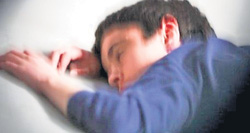
Why do we faint?Fainting is a temporary loss of consciousness, when the person falls to the floor. It's sometimes called passing out. What causes it? A faint occurs when insufficient amounts of oxygen are reaching the brain. There may be many reasons for this. The most common is a vasovagal attack, where overstimulation of a major nerve (called the vagus) slows the heart rate and lowers blood pressure. This overstimulation may be caused by intense stress, fear, pain or anything that suddenly increases pressure inside the body, such as blowing a trumpet.
Fainting may also result from low blood pressure (hypotension), often when someone stands up suddenly or is dehydrated and low in body fluids. More rarely, fainting is due to abnormalities of the heartbeat. Who's affected? Anyone may be affected by fainting, but people who are unwell or dehydrated are at greater risk. Fainting - or feeling faint - is also common in pregnancy. What are the symptoms? The person may start to feel light-headed, dizzy, nauseous and sweaty. They may have ringing in their ears and feel weak. Some people, however, have little or no warning symptoms. They then collapse to the ground and are unconscious for a few moments before coming round. They may feel woozy or nauseous for a little while afterwards and may vomit. What's the treatment? After fainting, a person should return to normal fairly quickly. If they don't, or have problems such as weakness or inability to speak, it may be more than a simple faint. The aim of treatment is to get more blood and oxygen to the brain. The aim of treatment is to get more blood and oxygen to the brain. Falling to the floor usually achieves this because the head is then at the same level as the heart. Once on the floor they should be put in the recovery position. If a person is feeling faint but isn't yet unconscious, they should lean forwards with their head between their knees or lie down with their feet raised above the level of their head. In most cases the person soon feels better, especially if given a drink and allowed to rest. If they don't regain consciousness within a minute or two, or if they have symptoms afterwards, urgent medical help should be sought. Repeated episodes of fainting should also be investigated further. - (BBC Health) |
|
||||||
|| Front
Page | News | Editorial | Columns | Sports | Plus | Financial
Times | International | Mirror | TV
Times | Funday
Times | Medi Scene || |
| |
Reproduction of articles permitted when used without any alterations to contents and a link to the source page.
|
© Copyright
2008 | Wijeya
Newspapers Ltd.Colombo. Sri Lanka. All Rights Reserved. |
